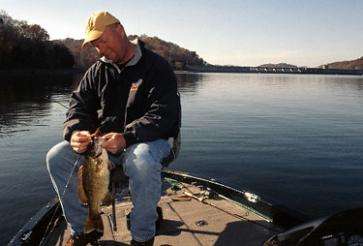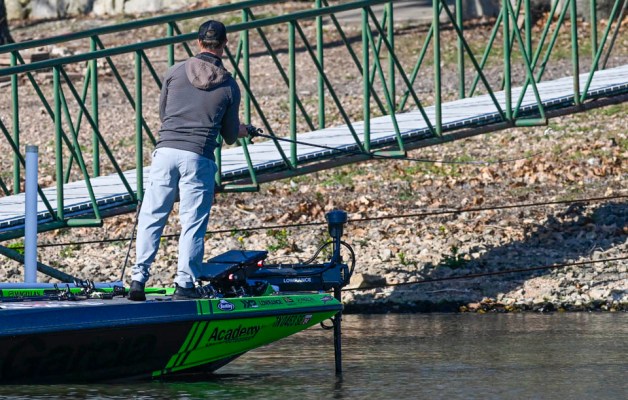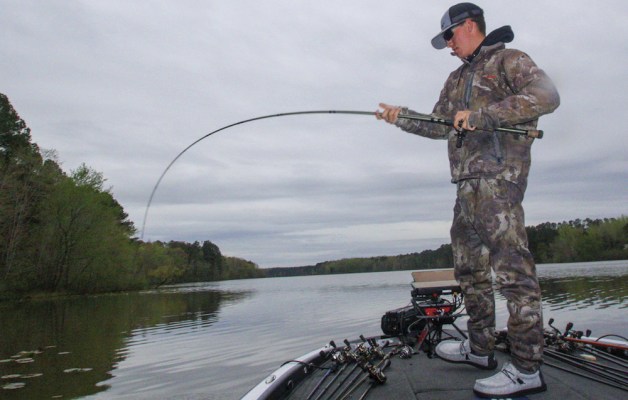
A question I get asked a lot at seminars is also one that keeps me thinking. Different folks will ask it different ways, but it usually goes something like this:
“How far do smallmouth bass travel? I was really on ’em last week, and then yesterday I pulled into the same area and they were completely gone! What happened?”
It’s a great question, and I wish I had an answer that was worthy of it, but I’m afraid we still don’t have enough information to answer that one with a lot of certainty. So, until we find ways to get a lot more information or find a bass that can talk, we’ll just have to speculate and use our best judgment on what’s really happening.
My friend, the great Billy Westmorland, used to tell me that smallmouths were homebodies. He believed they staked out a home area and stayed there. He thought this was especially true with really big bass.
But telemetry (a fancy word that means they tagged them with a transmitter of some kind) studies by the Tennessee Wildlife Resources Agency indicate that smallmouths move around quite a bit. What’s more, their studies showed that the bigger the smallmouth, the more she traveled!
These studies were done in the mid-1990s, well before Billy passed away in 2001, and when he heard about them, he pretty much just laughed and decided those biologists had no idea what they were talking about. He figured the only way those bass moved that much (up to 25 miles in a year) was in somebody’s livewell.
I’m not so sure, and I’m definitely not as quick to ignore the results of scientific research as Billy was.
The way I see it, there probably are some smallies that roam that much in a year, just as there are some folks who will drive across town to eat a burger they could have cooked at home. Luckily, I’m not trying to catch one individual bass that may be here today and two miles away tomorrow. I’m looking for all the bass I can find, and the bigger the better, but I’m mostly happy that those bass can only be one place at a time. So all I really have to do is find the spots that hold the fish.
I don’t care if the bass I’m casting to was in that spot yesterday or if he was all the way across the lake, and neither should you. If he’s there, I intend to catch him. And if I can’t catch him after a reasonable try or two or three, then I’m going to move on — not because I don’t think he’s not there, but because I’ve lost confidence that he’s there or that I can get him to bite. Once that happens, it’s time to move on.
So how do you put those odds in your favor? It’s really not that tough. The way I do it is to find those spots that have everything a bass could want — access to deep water, lots of cover, plenty of forage and close proximity to good spawning areas. If you can find a couple of these spots on your favorite smallmouth waters, you’ll have places where you can catch bass — including really good ones — all year long.
Whether they’re holding bass that live there all year long or just vacationers from up at the dam hardly matters. If you find one of these “year-round” type areas, you’re in business.
In order to determine whether or not you’re in such an area, ask yourself a few questions:
- Where will the bass winter in this area? Is there a deep bluff nearby — maybe something that intersects the main river channel?
- Where will they spawn? Are there some shallow flats with gravel that will hold the spawners?
- What about the food source, is this an area that will provide a variety of forage — from crawfish to baitfish?
If you can answer all those questions satisfactorily, you’ve found a potential gold mine. All you have to do is start eliminating the options — shallow or deep, rocky cover or grass, fast baits or slow — until you start getting some data back from the fish in the form of bites.
Now that’s the kind of scientific research I love!
Until next time, if you have any questions or comments, I’d love to hear from you. Please e-mail me atStephen@thesmallmouthguru.com.





